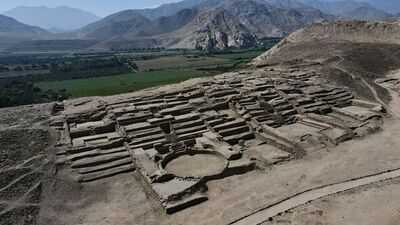A lost city has been found that's thought to date back thousands of years - but discoveries within it lead archaeologists to believe it's quite unlike many other ancient sites. The city of Peñico, located in northern Peru, is believed to have developed in the "cultural tradition" of Caral, the oldest known civilisation in the Americas, the main city of which lies nearby in the Supe valley and was founded in around 3,000 BC.
Peruvian archaeologist Dr Ruth Shady, who has led investigations at Caral for some 30 years, told BBC Travel that the civilisation "had intercultural relationships with people of the jungle, the mountains and across large distances as far as Ecuador and Bolivia, but always peacefully".
Experts believe Caral developed alongside early civilisations in Egypt, India, Sumeria and China, but in complete isolation.
The striking features of Peñico emerged during an eight-year excavation and research project by the Peruvian Ministry of Culture, exposing the grandeur of the ancient city, which is thought to have been founded between 1,800 and 1,500 BC.
18 structures were uncovered during the dig, including the remnants of temples and residential complexes.
Inside buildings in the former city, archaeologists also found extraordinary craftsman ship, including bead and seashell necklaces and clay sculptures of human and animal figures.
Scientists believe Penico may have emerged when the Caral began to move away their major urban centres after 1,000 years, according to Smithsonian Magazine.

The exodus is thought to have been caused by drought and famine, with experts previously theorising that all the inhabitants had fled to the coast with its supply of fish and shellfish.
But they now believe some may have adapted by moving to Penico, which was built upriver above sea level some 10km away from Caral-Supe. Moving closer to water sources fed by glaciers may have allowed them to survive despite the desperate conditions.
Another surprising discovery was the lack of militarisation at the settlement.
The research team found no evidence of warfare, weapons or fortified walls at the site, as would often be seen among communities of this time facing desperate shortages of resources.
Dr Shady says the city "continues Caral's tradition of living in harmony with nature and relating to other cultures with respect".
It's thought to have been trading hub between communities living in the Andes mountains and the Amazon basin.
Peñico has been opened by the government for public exploration, alongside Caral, its ancient fishing village of Áspero and agricultural community Vichama - giving visitors from around the globe the opportunity to discover the historic sites for themselves.
You may also like

Adoptions at decadal high in India, Maharashtra tops list accounting for 20% of total count

Madhya Pradesh: ED Attaches Properties Worth ₹4.5 Crore In Alirajpur District

IIT-Kgp PhD scholar found dead in hostel; 5th such case this year

Meteor shower or sat debris? Fiery streak dazzles Delhi-NCR skyline

Charlie Kirk's memorial service: Security upped after 'armed man impersonating cop' arrested







